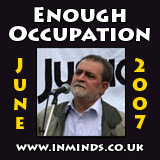
 Innovative Minds © 2014. All Rights Reserved. www.inminds.co.uk | ||||
Methodists concerned with Israeli occupation - N.E. Conference pushes to divestMichael Paulson, Boston Globe Staff Ratcheting up the simmering debate over how Protestant denominations should express their concern about Israel, the New England Conference of the United Methodist Church is advising congregations and individuals to divest their holdings from a wide variety of American corporations that the United Methodists believe support the Israeli occupation of Palestinian land.
You can't have peace while one group is occupying the land of another group.
William P. Aldrich, United Methodist Church divestment task force The action, although largely symbolic, is being greeted with dismay by leaders of the local Jewish community, but is giving new energy to the divestment movement, which had lost steam in other mainline Protestant denominations. The United Methodist Church, with 8 million members nationally, is expected to discuss the Middle East at its General Conference next year; in addition to New England, other conferences of the denomination have been debating divestment as a means to pressure Israel. "We're trying to have people recognize that something is going on in those occupied lands that's wrong, and we want it to change," said William P. Aldrich, chairman of the divestment task force of the denomination's New England Conference. "If a person is concerned about what's going on, this is a way of ensuring they are not making money from that." In 2005, the New England conference approved a resolution calling for a committee to develop "a list of companies that support in a significant way the Israeli occupation of Palestinian territories." In June, after two years of research and correspondence with the companies, the committee released a list of 20 companies from which it recommends divestment, including Blockbuster, Boeing, General Electric, Raytheon and Volvo. The rationales vary. The task force criticized Blockbuster for maintaining video rental kiosks in Israeli settlements and Volvo because some of its bulldozers have been used to knock down Palestinian houses. The committee posted all correspondence with the corporations on the Internet at www.neumc.org/divest. Blockbuster said its franchised kiosks do not violate the law, and Volvo said it cannot control how its vehicles are used once sold. Aldrich described the resolution as "not binding on anybody," but said the task force posted them "so anybody can look and decided if they agree with the conclusion or not." "You can't have peace while one group is occupying the land of another group," he said. Leading Jewish organizations are criticizing the United Methodist move and say they are worried that the step here could reenergize advocates of divestment nationally. They argue that divestment is not appropriate because Israel is unable to work with a Palestinian government that is associated with terrorism. "It won't matter if it's another isolated, and from our perspective, misguided, effort to bring what they think is going to be improvement in the Middle East conflict, but if it triggers off other denominational initiatives of this kind, yes, it will matter," said Lawrence D. Lowenthal, executive director of the Greater Boston chapter of the American Jewish Committee. The United Methodists' New England Conference has posted on its website letters of support from a variety of Jewish peace groups. But Alan Ronkin, deputy director of the Jewish Community Relations Council of Greater Boston, said those groups are "the most radical, anti-Israel elements of the Jewish community." It is not clear what impact the recommendations will have. The New England Conference has 93,000 members, of whom 43,000 live in Massachusetts. The conference spokeswoman, Alexx Wood, said, "The task force is a body of the Conference, and thus these recommendations are final, endorsed by the New England Conference, and a call to action for all United Methodists and hopefully others as well." But Wood said, "This is not a mandate; individuals are free to choose if and how to support this action." Among the individuals who are not supporting the action is Bishop Peter Weaver of the New England Conference. In an interview, Weaver said, "I think there are times when divestment can be a helpful tool in international policy matters -- clearly divestment was helpful in dealing with South Africa -- but as a matter of immediate implementation, I personally am not supportive of full divestment at this point. "I'm not opposing the work of the task force, but I believe we ought to be continuing in conversation with the Israeli leadership, as well as the Palestinian leadership, and trying to be evenhanded in our call for justice," he said. Nationally, the United Methodist Church cites a long history of using economic pressure for political purposes, starting with John Wesley, the founder of Methodism, who according to the church, avoided tea because it was linked to slavery. Michael Paulson can be reached at mpaulson@globe.com. Source: http://www.boston.com/news/local/articles/2007/07/31/methodists_concerned_with_israeli_occupation/ Also Of InterestPage URL: http://inminds.co.uk/article.php?id=10193
|
|
Support Us
If you agree with our work then please support us.Campaigns INMINDS Facebook Live Feed Latest Video's
INMINDS Twitter Feed Tweets by @InmindsComFeatured Video's
You need Flash player 8+ and JavaScript enabled to view this video.
[all videos (over 200)..] Featured MP3 Podcast  "Don't tell us what to accept and what not to accept. Don't teach us what is our right, and what is not our right. For my motherâs house, is my motherâs house. It can never become a zionist place. What is wrong is Israel, you have to tell the truth, what is this nonsense about accepting a racist entity that considers us sub-human, whilst they see themselves as super-human. Don't ever be tempted to tell a lady who has jut been raped that it was okay for her to be raped. And my people have been raped, and rape cannot be accepted, the whole of Palestine will be free - from the sea to the river, from the north to the south, and the refugees will return, and I will go back to my motherâs house. If I don't, I assure you my children will, my grandchildren will. One day we shall return!" Palestinian academic Enough Occupation Rally, June 2007 [5min / 3Mb] [all podcasts..] Newsletter Feedback |
 |
 |
















































